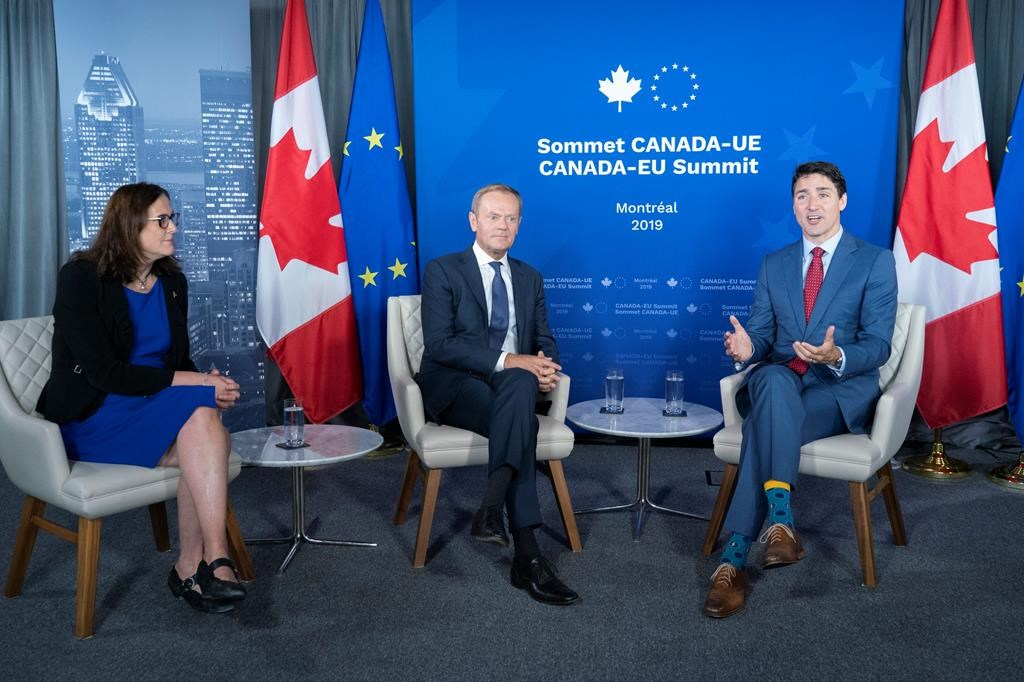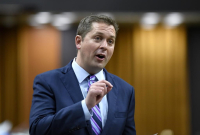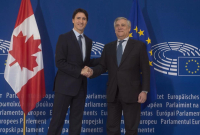Support strong Canadian climate journalism for 2025
Prime Minister Justin Trudeau and European Council President Donald Tusk ended a summit Thursday that was bathed in the symbolism of solidarity with critical words for U.S. President Donald Trump's inflammatory rhetoric towards female congresswomen.
Trudeau and Tusk also pledged to find ways to preserve a World Trade Organization appeals panel that faces paralysis in December if the Trump White House fails to appoint new members to keep it functioning.
Trudeau and Tusk repeatedly presented themselves as bulwarks against a world order under attack during their two-day summit in Montreal. But it was the spectacle of Trump's Wednesday night rally where attendees chanted "send her back" when the president referred to Rep. Ilhan Omar that forced them to point the finger at the president.
Tusk, the veteran Polish politician, is rarely reticent about speaking his mind, but he initially treaded carefully when asked about Trump, even though he drew attention to the controversy off the top of a joint press conference by saying that while he's been in Montreal no one shouted "send him back" at him.
Trudeau, however, denounced Trump's rhetoric more forcefully than he did earlier in the week, when the president unleashed the controversy with a weekend blast on Twitter — but without naming him.
"The comments made were hurtful, wrong and completely unacceptable," the prime minister said. "And I want everyone in Canada to know that those comments are completely unacceptable and should not be allowed or encouraged in Canada."
Tusk, however, chose his words carefully, appearing almost pained at having to address the issue.
"I don't want to comment on your neighbour's internal politics today, but I think that for all of us, I was — I've been for many years one of the most pro-American politicians in Europe. It's difficult to understand some facts, some words and sometimes if you feel that something is totally unacceptable, you have to react despite business, despite interests," Tusk said.
"For me, values are much more important than trade, sorry. Maybe I'm old-fashioned, but I will never change my opinion here."
EU Trade Commissioner Cecilia Malmstrom also demurred in an interview, but added: "this is certainly not the way we communicate" in the EU.
Omar is one of four Democratic congresswomen who Trump suggested should "go back" to their countries if they have criticisms of the United States. She is an American citizen who was born in Somalia, while the other three are American-born. None is white.
On Thursday, Trump told reporters in the Oval Office that he disagreed with the "send her back" chants and was unhappy to hear it at his rally.
Tusk and Trudeau lauded each other as friends and kindred spirits in the fight against rising populism, which threatens trade deals such as the comprehensive pact in goods and services between Canada and the European Union, known as CETA.
"Dear Justin, it is great to have you as a partner, and as a friend. In fact, I believe that you are Europe's best friend," said Tusk, who steps down this year from the council presidency.
On Thursday, they also discussed the need to preserve the World Trade Organization's Appellate Body if the U.S. continues to refuse to appoint new members by Dec. 10. The appeals body is down to three members from its usual seven.
Trudeau said Canada was endorsing the EU plan to set up an alternative, proxy version of the body to counter the U.S. refusal to appoint new members, which he called "especially concerning."
"A credible, functioning dispute resolution mechanism is critical to our success as a trading nation," Trudeau said.
"We've been working with the European Union to find an interim fix. After this summit, we're closer to finalizing an agreement, which would help preserve the function of an appeal system within the WTO until we find a more permanent solution."
Malmstrom told The Canadian Press that New Zealand would lead an effort at the WTO's General Council meeting next week to save the Appellate Body.
"We'll make a last push to see if we can do anything to save and reform the Appellate Body," she said.
"We might need to do contingency planning with others to make sure, also for the stability and the predictability for our companies, to make sure that we agree on something that would mirror the existing system."
She also praised International Trade Minister Jim Carr for leading an effort of about a dozen like-minded countries — minus the U.S. — to reform the WTO.
The leaders and their trade minister met Thursday morning to talk up the merits of the Comprehensive Economic and Trade Agreement, or CETA, which gives Canadian businesses preferred access to 500 million European consumers and a $24-trillion market in the 28-country bloc.
Parliament has already ratified the pact with the support of the Liberals and the Conservatives, but seven Canadian and Quebec politicians, including the leaders of the NDP and Green party, sent a letter to French lawmakers this week urging them not to follow suit.
Canadian business groups and Carr have branded that letter as disappointing and disturbing given the previous approval of the deal by the House of Commons. Trudeau questioned with whom the NDP would sign a trade deal if not with Europe, which he cited as having progressive policies for workers and families.





Comments